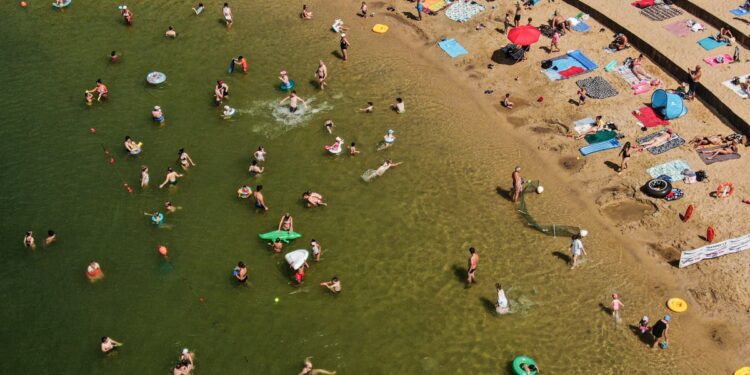Meteorologists said temperatures were even higher than officially reported in big cities where sizzling concrete radiates the heat above the ground and the asphalt softens under one’s feet.
“It was impossible to breathe yesterday,” said Antonela Spičanović, from the Montenegrin capital of Podgorica, where temperatures reached 39C (102F) on Wednesday. The city seemed deserted with many of its residents staying indoors or heading for the Adriatic Sea coast or the mountains.
“I spend my days in the apartment, under the air conditioning,” said Đorđe Stanišić, an electrical engineer also from Podgorica. “It’s hell outside.”
Mendim Rugova, a meteorologist from neighboring Kosovo, said temperatures in the country have risen on average by 2.5 degrees since the 1980s. He said the current heat wave could last until the end of July.
“In the region we could see temperatures above 40C, in parts of Albania, Northern Macedonia, in Greece and also in parts of Serbia,” he predicted.
In Czechia’s capital of Prague, where temperatures reached 34C Wednesday before dropping slightly Thursday, the city zoo delivered ten tons of ice to provide much-needed relief for the animals.
 Polar bears cool down in ice that was brought to their enclosure on a hot and sunny day at the Prague zoo, Czech Republic, Wednesday, July 10, 2024ek) (Copyright 2024 The Associated Press. All rights reserved)
Polar bears cool down in ice that was brought to their enclosure on a hot and sunny day at the Prague zoo, Czech Republic, Wednesday, July 10, 2024ek) (Copyright 2024 The Associated Press. All rights reserved)
The ice was strategically placed around the zoo Wednesday creating cool spots where animals could find refuge from unusually high temperatures.
In the Romanian capital Bucharest, street thermometers showed 42C ( 107F) on Tuesday and Wednesday though the official measurements were a few degrees lower.
Neighboring Serbia reported record temperatures so far this summer, with thermostats at 35C (95F) Thursday morning in the north of the country. In the capital Belgrade, doctors reported treating people who collapsed, felt dizzy or complained of headaches due to the heat.
 Tourists protect themselves from the sun as they walk near the Colosseum on July 11, 2024 in Rome where temperatures reach 38 degrees celsius (AFP via Getty Images)
Tourists protect themselves from the sun as they walk near the Colosseum on July 11, 2024 in Rome where temperatures reach 38 degrees celsius (AFP via Getty Images)
Serbian authorities have said that the use of air conditioning led to huge power consumption similar to levels normally seen in winter, when many in the Balkan country use electricity for heating.
During a previous heat wave last month, Montenegro, Bosnia, Croatia and Albania faced a major power outage amid the overload and a collapse of a regional distribution line. Earlier this month, a powerful storm swept the region after days of heat and killed two people, damaged houses while pulling out trees and flooding streets.
Experts say human-induced climate change has brought wild weather swings, increasingly unpredictable storms and heat waves.
Source link : https://www.independent.co.uk/news/world/europe/europe-heatwave-weather-greece-serbia-b2578198.html
Author :
Publish date : 2024-07-11 15:34:03
Copyright for syndicated content belongs to the linked Source.


